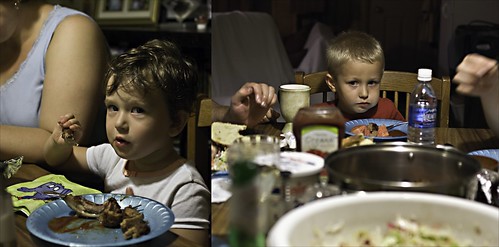Category — 1.3 Kindergarten 6-12: Language Development
Language Development
Kindergarten children continue to develop and refine their communication skills. They can now usually speak in long and complete sentences (see full Glossary) and they delight in learning new words.
RECEPTIVE LANGUAGE
(see full Glossary)
Most kindergarten children are specifically able to:
- follow two and sometimes three step directions; for example, “put your slippers on, and put your shoes away”
- understand most of what is being said to them at home and at school or in familiar environments.
EXPRESSIVE LANGUAGE
(see full Glossary)
Most kindergarten children are specifically able to:
- let others know, that is, communicate, most of their wants and needs using their words (or verbally);
- use complete and complex sentences;
- ask questions using the words “how,” “what,” “when,” “why,” “where,” and “who;”
- use negations, or “no” sentences (for example, I don’t want to do this).
ARTICULATION
(see full Glossary)
Most kindergarten children are specifically able to:
- speak clearly and are understood by most people;
- pronounce most sounds correctly; for example, vowels (a,e,i,o,u) and consonants (b, c, k, p, and others);
- pronounce or try words with two- and three-sounds or “blends” like in the, fish, blue and green
PRAGMATICS
(see full Glossary)
Most kindergarten children are specifically able to:
- use language for social reasons (that is, to communicate with others (see full Glossary));
- raise the intonation (see full Glossary) in their voice when asking a question;
- understand some forms of body language (Fig. 1) (for example, someone who is frowning his face is not happy).
Figure 1: Body language
DID YOU KNOW?
- Although the speech of kindergarten children is understood by most, some of them may still struggle with the pronunciation of certain sounds, especially “r”, “l”, “s”, “gh, in pleasure”, and “th” in “the” thick.”
- Children at this age are starting to use language in a humorous way (see full Glossary). They are starting to understand “knock knock” jokes and will often begin playing around with words (that is, enjoying the “pun” in certain words and expressions in their own language)
see References
December 3, 2011 No Comments
